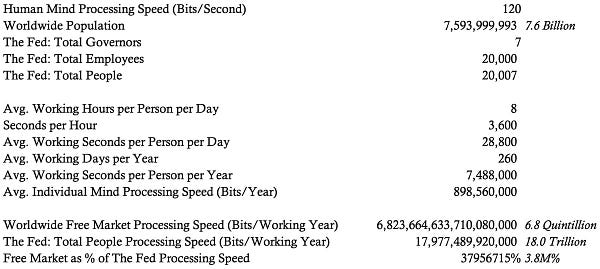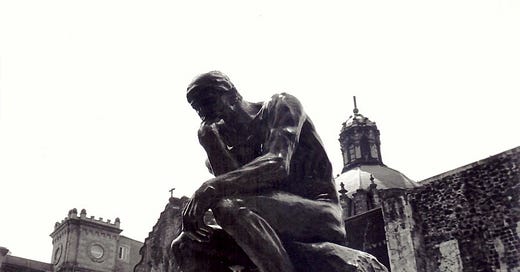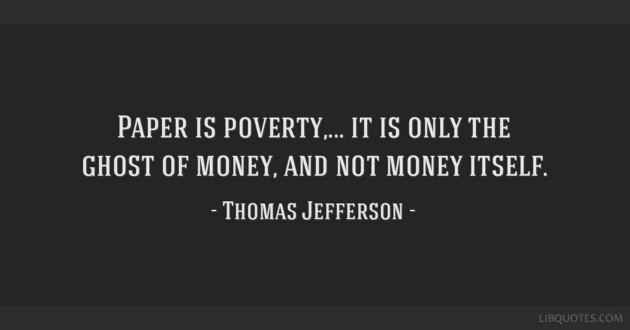

Discover more from The Freedom Analects
Our Most Brilliant Idea (Part 1)
Exploring humanity's greatest idea historically, and its novel form in modernity.
Ideas ambulate humanity across history. A new and useful idea is an innovation, which can benefit everyone for the rest of time. Therefore, it is critical we construct socioeconomic structures conducive to the creation of new ideas: civilization can only advance amid an everlasting flow of fresh knowledge. Free trade is the means by which we maximize ideation and its physical manifestation: wealth creation. Anything that impedes trade—like central banking—is (by definition) a terrible idea. Contrarily, all accelerants to free trade—like money—are among the most brilliant ideas we’ve ever had.
Ideas Drive Economics
“A pile of rocks ceases to be so when somebody contemplates it with the idea of a cathedral in mind.”—Antoine De St-Exupery
Ideas are the origins of everything we say, do, or make. The purpose of any economy is to generate and share useful ideas through free trade (to achieve what economists call the division of labor or knowledge specialization). Civilization emerges not by an aimless concourse of variation, but rather it is molded in the image of our ideas, which we express through action to remake the face of the Earth. Better ideas, or sharper knowledge, equip mankind to more intelligently harness the gifts of the Earth to satisfy his wants to ever-higher degrees in ever-less time. In ideological space, competition is free and fierce: only the most useful ideas survive the test of time. Resultant knowledge encodes the patterns of action we use to etch our imaginations into the world around us. Winning ideas are chosen by the market, only to be widely distributed as material riches, finer manners and morals, and more profound art. Our lives are lived enacting our ideas. As HG Wells said:
“Human history is, in essence, a history of ideas.”
Or as William Durant elaborates:
“History as a laboratory rich in a hundred thousand experiments in economics, religion, literature, science, and government—history as our roots and our illumination, as the road by which we came and the only light that can clarify the present and guide us into the future.”
Pouring forth from our forebears is this civilizing heritage of ideas sharpened through free trade and expressed in the tools, techniques, and cultures we make for ourselves. As we trade, our ideas become better, giving everything we say, do, or make more want-satisfying qualities. Consider how our language has evolved from grunts to enunciations, or how our behaviors have been shaped by culture, or how our transportation technologies have progressed from wagons to airplanes.
*Join me at the biggest event of the year, Bitcoin 2022. See below for 10% discount on tickets*
“Bitcoin 2022 Conference is the biggest gathering of the Bitcoin ecosystem in the world. Join me and the movers and shakers shaping the Bitcoin future next April 6-9th in Miami Florida for Bitcoin 2022 Conference.”
Paying with Fiat? 10% Affiliate link: http://tixr.com/pr/robertbreedlove/26217
Paying with Bitcoin? Use promo code: BREEDLOVE.
Substantive ingredients for all modern miracles surrounding us today have always been available, but prior to their invention, we simply lacked the ideas necessary to manifest them. As the living generation responsible for ideation, our aim must be to forge our ideas into finer form for posterity: an aim we accomplish through innovation.
Innovation is simply a reconfiguration of the “raw materials” of nature by indexing them to our most useful idea structures. Said differently: creativity is taking known elements and reassembling them in accordance with new knowledge. Sharpening knowledge to better satisfy ourselves requires fires from the ideological collisions and frictions innate to trade. Trade, then, is mankind’s “meta-idea” — the generative idea of all our best ideas. Meta (from the Greek μετά, meaning “after” or “beyond”) is a prefix meaning more comprehensive or transcending: trade is an idea about improving ideas. It presupposes that anyone may know something everyone else does not, incentivizes them to teach the rest of us, and lets us all capitalize on any such learning opportunities. Trade indicates to us whether we are ill-informed in the pursuit of a goal, which can save us from harm, or help us achieve it more easily. Wealth generation is inseparable from ideation: the more we know, the more effortlessly we satisfy our (present and potential future) wants through innovation, and the more wealth we gain. Author Matt Ridley captures the spirit of this relationship between free trade and innovation in these words:
“Innovation is the child of freedom and the parent of prosperity.”
Free market capitalism is an idea unequaled in its generation of innovation. It proved itself as the most successful economic model for expanding trade, ideation, and wealth creation in the 20th century ideological contention between American capitalism and Soviet communism. Misguided by utopian promises, Soviet Russia attempted to replace the profit motive intrinsic to American capitalism with appeals to nationalistic faith and devotion, thereby poisoning the wellspring of learning engendered by trade.
*Looking to earn yield on some of your long-term Bitcoin holdings? Try Tantra Labs*
Put your Bitcoin to work. Earn up to 12% interest back on Bitcoin with Tantra: Start Earning Today
Under the moralistic camouflage of communism (“from each according to their ability, to each according to their needs” was the Marxist slogan) some of the most gruesome atrocities in history were perpetrated. Soon into the Soviet experiment, productivity collapsed, and millions starved or were slaughtered by the state. When governments play God, civilizations burn in hell. Soviet Russia rediscovered what wise Aristotle had warned centuries earlier:
“When everybody owns everything nobody takes care of anything.”
American capitalism outcompeted Soviet communism. Capitalism is a socioeconomic system premised on the three pillars of private property rights, rule of law, and honest money. Private property rights represent an exclusive relationship between individuals and any portion of nature they invest their time in reshaping; rights they can then exchange with similarly self-sovereign people. Rule of law is a mechanism for nonviolently resolving private property disputes. Honest money is the private property unimpeded market processes naturally select as most tradable. Since capitalism optimizes for trade, it supports this generative source of new ideas by incentivizing economic cooperation and (peaceful) competition. Indeed, the stability of rules is the bedrock of peace: with fixed and simple laws, market participants are forced to play the game well to make an honest living. As Bastiat said:
“When goods don’t cross borders, soldiers will.”
In an elemental sense, trade is the water that sustains innovation, and its steadfast flow a source of peace. Capitalism is the socioeconomic “water well” built to protect this everlasting ideological wellspring of civilization—trade.
The Idea Supercomputer
“Great minds discuss ideas. Average minds discuss events. Small minds discuss people.”—Eleanor Roosevelt
As the ultimate token of trade, money is an indispensable tool for ideation. In trade, everything is valued at some ratio of everything else. For instance, a car might be worth 132 chairs, or a house worth 11 cars. Money is the medium through which we more easily calculate these exchange ratios: a tool that simplifies trade by standardizing its intermediation. Like all tools, money lets us achieve greater results with less efforts, and the time-savings tools impart is wealth. Specifically, money lets us calculate, negotiate, and execute trades more quickly.
*Learn from the experts at IBAC what role Bitcoin plays as an emerging investable asset, in the preservation of long term wealth*
IBAC helps sovereign institutions succeed with Bitcoin: https://www.ibac.io/
Without money, a constant recalculation of countless exchange ratios among different economic goods would be necessary. With money, all exchange ratios are compressed into a single number — the money-expressed market price. In this way, money is an accelerant to trade and (its invisible twin) ideation. Standardization to one money creates economies of scale in trade. Such economization is what drives the market to coalesce around a single money — as we saw with gold and (its former currency abstraction, and now apparition) the US dollar:
Money is the medium through which market participants express their ideas, preferences, and values. Pricing systems are economic telecommunication networks endlessly echoing and coordinating market action by dynamically informing everyone of everyone else’s trades. For instance, when you buy a car and sell a house, the economy responds adaptively by producing more cars and less houses. Even when you buy a public equity, you are expressing the idea its expected future cash flows are worth more than its current price, and the marketplace absorbs this thesis when you execute the trade. Price signals perpetually prime incentives to ensure resources are allocated in accordance with the current aggregate composition of market participant preferences. Entrepreneurs engaging in trade give rise to truthful pricing as they strive to buy low, sell high, and profitably serve one another. A true free market is a forum of unhampered and voluntary exchange where ideas compete, combine, and transform. Seen this way, the free market may be considered the ultimate distributed computing system — a nexus of consciousnesses driven by human action and interconnected by prices.


Money improves the extensibility of our minds. Thinking is an expression of rationality: the act of comparing all relevant factors to any course of action. By cognitively generating different aspects and avatars relevant to any given situation, humans create mental staging areas for future action. As with the root word of rationality — ratio — thinking involves contrasting one thing against another. When we extend our thinking into money, we gain insight into the collective mind of other market participants through price signals, which themselves are expressions of rationality: ratios of exchange denominated in monetary terms. By consolidating the rationality of all market actors into the market price, ideation explodes. In this way, free markets are idea-generating supercomputers. This is why American innovation is unrivaled. Mankind makes the world his own by channeling energy across the ideological field lines fashioned in his extended mind—the free market.
Thank you for reading Our Most Brilliant Idea (Part 1).
PODCAST
SOCIAL
SUPPORT
Send Bitcoin to my PayNymID: +tightking693
RECOMMENDED BUSINESSES
Subscribe to The Freedom Analects
Written works exploring truth, power, freedom, money, economics, virtue, sovereignty, philosophy, and other enigmas of existence.









because, math.